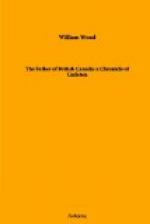Montreal was most in touch with the disaffected people to the south. It also had a magistrate of the name of Walker, the most rancorous of all the disaffected magistrates in Canada. This Walker, well mated with an equally rancorous wife, was the same man who entertained Benjamin Franklin and the other commissioners sent by Congress into Canada in 1776, the year in which both the American Republic and a truly British Canada were born. He would not have been flattered could he have seen the entry Franklin made about him and his wife in a diary which is still extant. The gist of it was that wherever the Walkers might be they would soon set the place by the ears. Walker, of course, was foremost in the persecution of the redcoats; and he eagerly seized his opportunity when an officer was billeted in a house where a brother magistrate happened to be living as a lodger. Under such circumstances the magistrate could not claim exemption. But this made no difference either to him or to Walker. Captain Payne, the gentleman whose presence enraged these boors, was seized and thrown into gaol. The chief justice granted a writ of habeas corpus. But the mischief was done and resentment waxed high. The French-Canadian seigneurs sympathized with Payne, which added fuel to the magisterial flame; and Murray, scenting danger, summoned the whole bench down to Quebec.
But before this bench of bumbles started some masked men seized Walker in his own house and gave him a good sound thrashing. Unfortunately they spoilt the fair reprisal by cutting off his ear. That very night the news had run round Montreal and made a start for Boston and Quebec. Feeling ran high; and higher still when, a few weeks later, the civil magistrates vented their rage on several redcoats by imposing sentences exceeding even the utmost limits of their previous vindictive action. Montreal became panic-stricken lest the soldiers, baited past endurance, should break out in open violence. Murray drove up, post-haste, from Quebec, ordered the affected regiment to another station, reproved the offending magistrates, and re-established public confidence. Official and private rewards were offered to any witnesses who would identify Walker’s assailants. But in vain. The smouldering fire burst out again under Carleton. But the mystery was never cleared up.
Things had now come to a crisis. The London merchants, knowing nothing about the internal affairs of Canada, backed the petition of the Quebec traders, who were quite unworthy of such support from men of real business probity and knowledge. The magisterial faction in Canada advertised their side of the case all over the colonies and in any sympathetic quarter they could find in England. The seigneurs sent home a warm defence of Murray; and Murray himself sent Cramahe, a very able Swiss officer in the British Army. The home government thus had plenty of contradictory evidence before it in 1765. The result was that Murray was called home in 1766, rather in a spirit of open-minded and sympathetic inquiry into his conduct than with any idea of censuring him. He never returned to Canada. But as he held the titular governorship for some time longer, and as he was afterwards employed in positions of great responsibility and trust, the verdict of the home authorities was clearly given in his favour.




